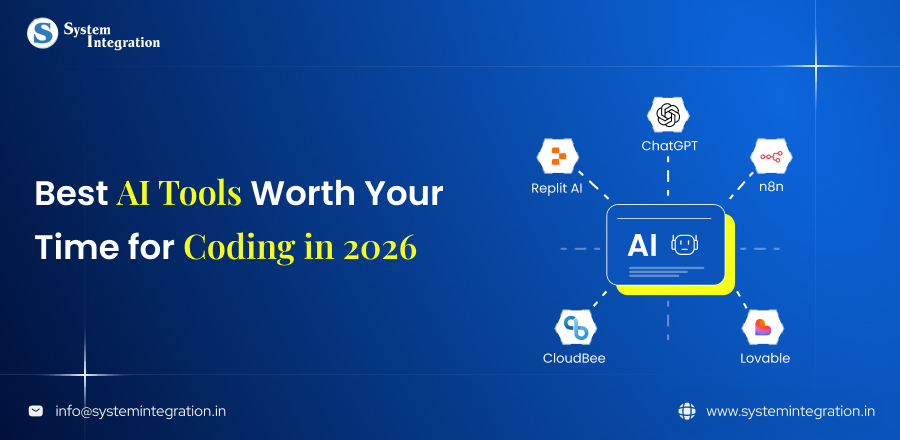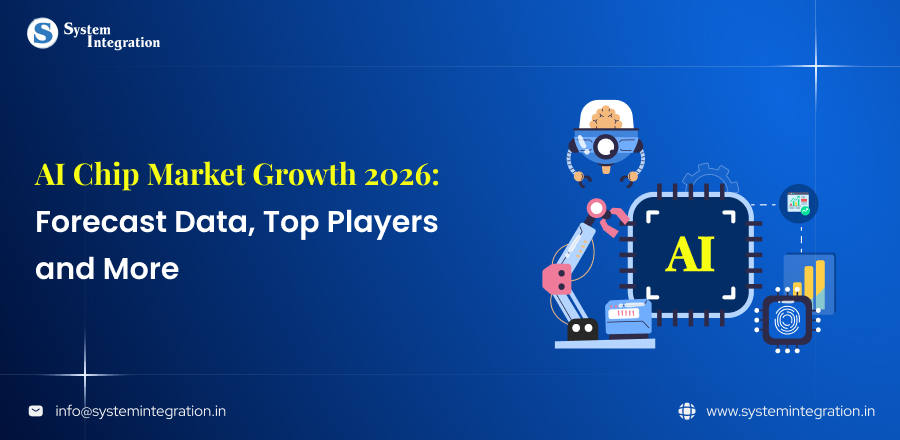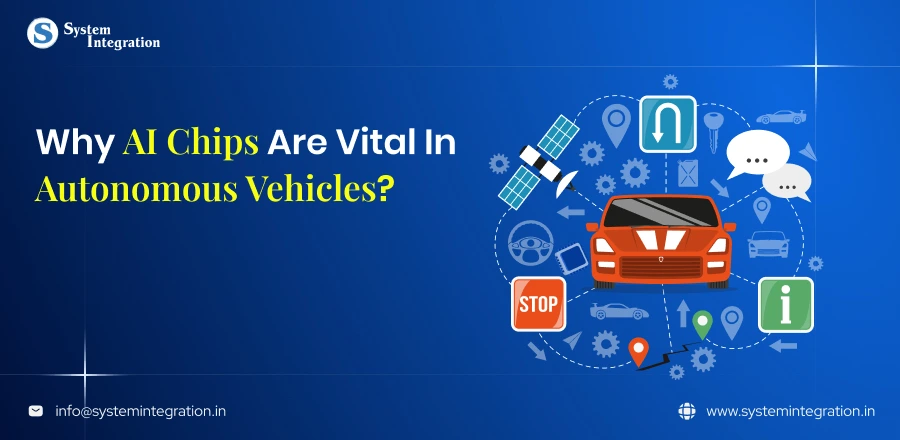Introduction
The fast changing business scene of today buzzwords such as AI agents vs agentic AI have become popular and few among decision-makers really understand the critically important distinctions between the two.
And for forward thinking companies, this difference is more than a matter of general knowledge. It should influence the way you think about automation, customer experience, operational efficiency and even product innovation.
The role of context and autonomy in AI as AI-driven tools grow more autonomous and context-dependent, it is vital to better comprehend what we can expect from these new paradigms. Are you playing “AI as a servant game” or are you playing “how do i create a power structure that thinks the game?”
In this article, we’ll explore what AI Agents and Agentic AI means and how they fit into enterprise applications, and then explain how that difference can inform smarter AI automation strategies at scale.
What are AI Agents?
The AI agents services are autonomous, or semi-autonomous. Software entities that accomplish tasks perform decisions or interact with systems or users, using goals, data and programmed intelligence as their guidelines.
For the B2B environment, AI agents help optimize work and lower the amount of manual work, as well as make them more effective through the automation and instant knowledge.

Examples:
- Customer Service Agents: The Level 1 inquiries, ticket routing, and 24/7 support provided by AI chatbots like Intercom’s Fin or Zendesk AI.
- Sales automation: AI tools to automate, such as Drift or Exceed. AI that qualify leads, book meetings, and follow up with prospects on your behalf.
- Finance Assistants: tools like Vic.ai aiverobotetic processing and expense classification for businesses.
- IT Automation Agents: ServiceNow Virtual Agents that address frequent IT requests and execute backend activities such as password resets.
Key Features:
- Autonomy: Agents work independently with low human interaction to ensure scalability.
- Performance-Based: They are designed to attain business purposes such as lead conversion, cost reduction and SLA compliance.
- Data-Drive Decisions: AI-agents reference historical and real-time data to make more accurate and personalized results compared to manual solutions.
- Integration-Ready: they integrate easily with CRMs, ERPs, and other business systems.
What is Agnetic AI?
Agentic AI refers to AI systems that can act autonomously, make decisions, and take actions to achieve goals with minimal human intervention. Unlike traditional AI that reacts to input or follows pre-defined rules , agentic AI services can plan, adopt, and learn from its environment to handle complex, multi-step tasks.
Examples
- Sales: Agnetic AI can automatically classify high quality leads, personalize outreach and guide prospects through the funnel.
- Recruiting: AI agents services can perform resume screenings, set up interviews, and make initial qualifications of candidates.
- Customer support: it can keep a close eye on their accounts, flag potential churn problems and engage customers with renewals or upsells.
- Marketing: agentic AI services can produce personalized campaigns that monitor performance and automatically tune for engagement.
Key Features
- Autonomous execution: it not only recommend actions, they execute them end to end (e.g., find candidates or send proposals).
- Cross functional assistance: across the organization, enforces cohesion and shared data stories.
- Adoptable workflows: created for specific organizations with minimal dev efforts.
- CRM + ATS Integration: integrates with solutions such as salesForce, HubSpot.
Characteristics Comparison Of AI Agents vs Agentic AI
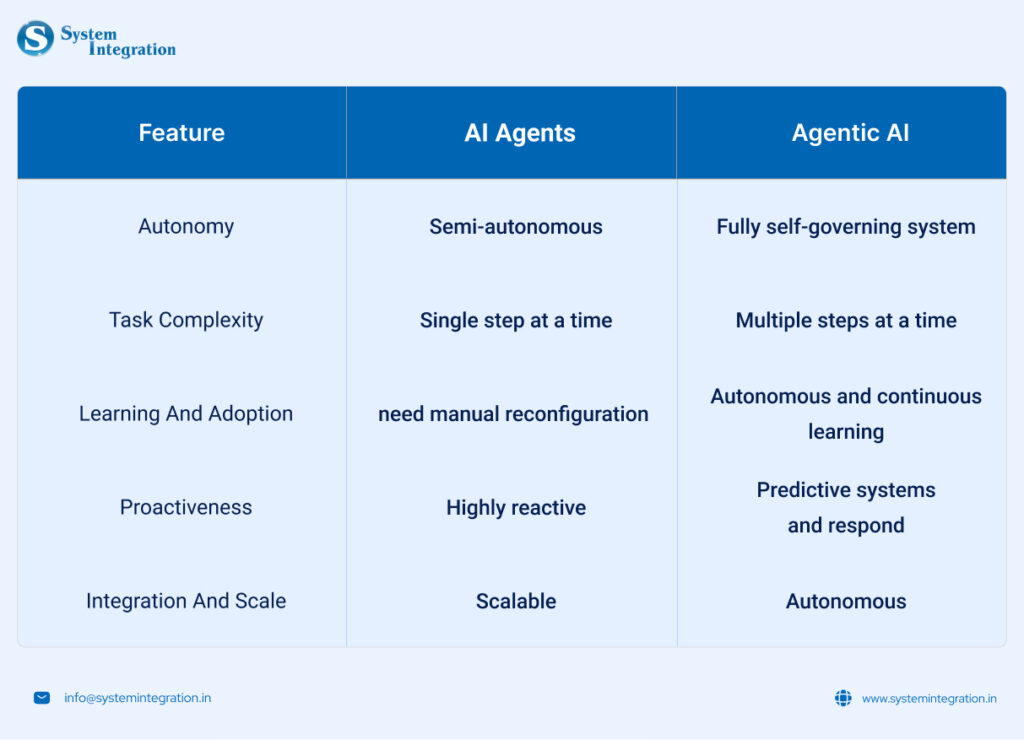
Autonomy
AI Agents:
Typically semi-autonomous. They are founded on rule-based triggers or user input for the cause of action. Useful for recurring, pre-defined tasks.
Agentic AI:
Completely self-governing systems that autonomously finish complex workflows. Perfect for B2B scenarios such as sales engagement, candidate screening, or onboarding customers with minimal human intervention.
Task Complexity
AI Agents:
Do well with single-use or narrow-case applications, like FAQ responses, record updates, or reminders.
Agentic AI:
Manages multi-step, information dense processes that include branching decisions, data processing, and integration between systems and departments.
Learning And Adoption
AI Agents:
May not be flexible with regards to learning, and may need to be manually reconfigured when business practices change.
Agentic AI:
Agentic AI, characterized by its autonomy and continuous learning, is transforming various industries like healthcare, retail, automotive etc by enabling intelligent agents to operate with minimal human intervention and adapt to dynamic environments.
Proactiveness
AI Agents:
Highly reactive, following orders or prompts, not active in surfacing insights or acting preemptively.
Agentic AI:
Predictive systems that observe trends, identify irregularity and respond (e.g., get in touch with a customer who has become inactive or alert to customers at risk of churn).
Integration And Scale
AI Agents:
Demands adoptable APIs to integrate. It can be challenging to scale some approaches across teams or platforms.
Agentic AI:
Designed to work well with your CRM, ERP, ATS and productivity tools. Software scales easily across workflows and departments with centralized control.
Why Does The Difference Matter?
Effective AI Adoption
The type of AI you choose determines how fast and how well your company can adopt automation. AI agents provide a good first step, but Agentic AI allows for scaled, enterprise wide transformation.
Risk Management
AI Automation brings risks like operational, compliance, and data privacy. Conventional agents can choke under complicated conditions, or worse, do the wrong or inconsistent thing without human supervision.
Business Impact
While AI agents can save minutes per task, Agentic AI can re-imagine entire workflows, power revenue expansion, and transform customer experience across your organization.
The Future
AI agents might be good enough for current purposes, but Agentic AI is more appropriate for a future where AI will collaborate, decide and evolve on its own.
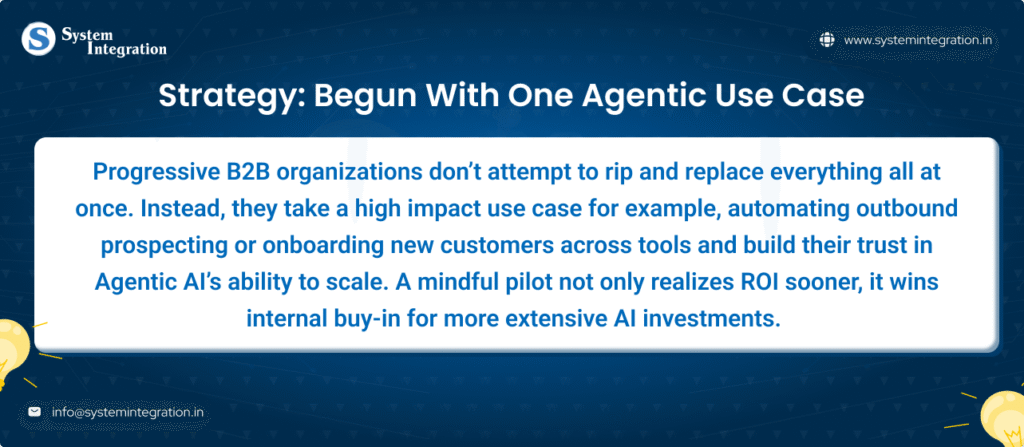
Conclusion
Distinguishing between AI Agents vs Agentic AI is more than just technical matters, it is strategic. Traditional AI agents provide useful assistance in task specific automation, Agentic AI services however, are a game changer. autonomous, proactive, and able to coordinate complex, multi-step smoothly.
However, if you are still confused about making the decision and willing to make your own customized version than you are at the right place as we have experienced developers at BMVSI AI software development company who can help you launch your digital platform in no time.
FAQs
While AI Agents adhere to scripted actions, Agentic AI has autonomy, makes decisions and can adapt to new circumstances.
Agentic AI does not require any human to function, it will take decisions and actions in response to goals and context.
Generally, yes. All of these AI agents are targeted towards a specific set of tasks and whereas the Agentic AI software is a program that manages more generic abilities in the language, such as reasoning over sets of mixed goals and beliefs with dynamic multi-step reasoning, complex problem solving with diverse decision-making needs etc.
It depends on your needs. AI Agents are great for automating repetitive, rule-based tasks while Agentic AI is better suited to helping with adaptive, strategic and progressive workflows.



